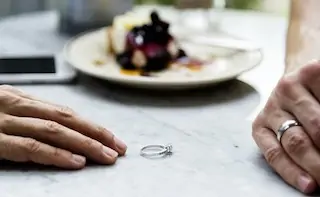Empath and Narcissist. Why Empaths Attract Toxic People

You’ve heard it before – empaths attract narcissists – but maybe you’ve never really understood why or what that means exactly. So let’s piece it apart in today’s blog. Why do empaths attract toxic people? Shouldn’t kindness, compassion, and generosity attract good things?
First, we have to understand what an empath is. An empath is someone that is deeply tuned in to their emotional environment and as a result so sensitive that they absorb both the positive and negative stressful energies around them. They’re the type of person that can put themselves in someone else’s shoes easily. Often, they can take on the pain of others at their own expense. So, if you can tell immediately when a friend is unhappy and then you start to feel those emotions too, then chances are you’re an empath.
There are obviously good and bad aspects to being an empath. You can imagine that if you understand other people’s feelings without them having to say much, that your level of communication is deeper than most people. You’re an excellent listener and friend. Loyal with a heart of gold, your emotional intelligence and intuition surpass most. But as children and adults, being overly “sensitive” is often shamed rather than encouraged. Being an empath, I’m here to tell you, is nothing to be ashamed of.
What is a narcissist, you ask? When you’re a narcissist, you pursue gratification out of vanity or egotistic admiration for your self-image. There is, of course, a level of narcissism that can be healthy – loving yourself is not something that is toxic. But Narcissistic Personality Disorder, unlike being an empath, is a mental disorder. True narcissists crave attention, respect, and have a total lack of empathy for the needs of others in that quest. As a result, they manipulate others to get what they want and are not truly emotionally available.
But here’s the thing: true narcissists only account for around 1 percent of the population. So how is it that empaths and narcissists are attracted to one another, when they’re so few and far between and so toxic to one another? Is the age-old saying “opposites attract” really that true?
Narcissist and Empath. Why they attract each other

What the narcissist lacks is exactly what the empath has: empathy. Many narcissists draw people into them by making them feel good, almost like an addictive substance. They’re attracted to empaths because they can get the greatest use from them, so they act charming and friendly to mask their tendencies in order to receive love. Anyone would be hooked.
But especially an empath. As a child, empaths were conditioned to prioritize the needs of others over their own. And now, that’s the same thing they do – they empathize with the problems and needs of their partners, and they want to give them the attention and respect they ask for. What results is a one-sided relationship in which the narcissist benefits from all the compassion, caring, and love that the empath has to offer, and the empath is in a relationship with someone cold, withholding, and unconcerned with their world. No matter how much the empath does, it is not enough to satisfy the narcissist. It is very hard for an empath to believe that the narcissist just doesn’t have empathy.
What results is a trauma bond. We enter trauma bonds because we interpret familiar behaviors as intense sexual attraction or chemistry. In other words, two people emotionally connect in a dynamic that was found in their childhood. Empaths are conditioned to absorb the feelings of others. Narcissists are conditioned to see their self-love inflated through how their parents treated them. The narcissist’s “self-love” is what protects them from their own illness. You see, narcissists were conditioned to their own megalomania through inconsistent childhood interactions. That’s a whole other topic in itself.
The Empath and Narcissist Relationship

The result is a toxic relationship. The narcissist manipulates and becomes very good at gaslighting and turning scenarios around to suit their image of self-love. The empath usually cowers apologetically, understanding the feelings of the partner to an extreme where they feel at fault for making them upset. All an empath wants to do is serve, to give to their partner — and this is an admirable thing. The problem is that as time goes on it drains them. They start feeling a self-destructive cycle that is hard for them to understand. “Why is it that I keep doing the same thing over and over? Why is my love not being given back to me?”
The more entrenched an empath becomes in the relationship with a narcissist, the more they have the feeling that they can change them. Not only can a partner never fully “change” who they’re in a relationship with, but a narcissist especially can’t be changed because they’re so deeply conditioned in their behaviors. They’re incapable of seeing their own flaws.
Empath and Narcissist Breakup: How to Recover
Now it’s over. You’ve gotten to the point of exhaustion and loss of self, and you can’t take it anymore. Congratulations – you’ve managed to get yourself out of a toxic relationship! So why do you feel so much anger? How can you recover from this type of breakup?
Empaths typically internalize their rage, seeing it as self-hatred and self-dismissal, whereas a narcissist would do the exact opposite – use their rage as projection and blame in order to dispel the feeling of anger. Most empathetic folk bottle up their rage, suppressing it and disowning it in order to replace that feeling with understanding another’s motivations. Their capacity to feel another person’s pain comes at their own expense because it requires them to suppress their own anger, which can often lead to severe depression.
The trick to recovery for an empath is to allow yourself to fully feel that rage. Acknowledge it – accept that it is ok to lose your composure and care for another person. It is ok to “bark and bite” and use ways of setting a motivated boundary. The more you embrace your anger and allow it to protect you through the use of creating boundaries, the less power the narcissist has over you. Understand your limits and take the power to not go beyond giving to the point of exhaustion and mental instability. Understand that when a person doesn’t serve you as you serve them, then they don’t deserve to be a part of your life. Learn to create healthy boundaries now.

Learn how to not take on their baggage. It is okay to be sad, angry, upset. Those are normal. And it is okay to write out, journal, and realize that some of the things that they were putting on you in the relationship, were never your responsibility. Give them back their “baggage” now. It’s not yours to carry.
Can an Empath and Narcissist Work?
Narcissism exists on a spectrum – so while it’s healthy and normal to be confident and appreciate the attention of others, it’s a problem when it starts to interfere with daily functioning. Similarly, empaths exist on a spectrum. Not all empaths lose their sense of self and give everything they have in a relationship with a narcissist. Some know their boundaries well and are able to set them. The key is the balance on both sides of the spectrum, and being self-aware enough to move forward and understand ourselves.
The short answer, however, is that a true empath and a true narcissist with a personality disorder is a toxic and abusive relationship. In its truest form, the narcissist and the empath cannot change one another. That’s when it’s important to seek outside professional help.
Ultimately, as is usually the case, this is all about finding the right balance of love for oneself. If you’re an empath like me, you’re vulnerable to people that want to use your love for their own advantage, but your love and generosity is nothing to be ashamed of. It is your superpower. Let yourself see that power for what it is.
As always, remember you are loved.
Your coach,
Apollonia Ponti











Very enlightening article. It just gave me a clear reality on what happened on my break up and thank you for providing those info.
so happy to hear that Athanasios!!! you are very welcome .
This came to me when i needed it the most. Thank you, Compassion, Love, Empathy.
Hi Richard,
Your welcome. I know these situations are hard but we all learn and grow from them. You got this! Thank you for reading my blog about Empath and Narcissist. 🙂
Best,
Apollonia
I am still Married to my Narcissist…But I came to the anger and have let him know about how he hasn’t and can’t
match the service I give…and I am loving myself and taking the time to be kind to myself and change the subject of my husband when it upsets me. I am working on it. I instinctively put more boundaries between us which suprised my husband. Very helpful article for me. Thank you very much!
Empath here. I broke up 8 years ago with one – extremely toxic and abusive. Emotionally available etc.
Still, we remained best friends (no contact for 8 months – and he nearly died twice in that period of time, becoming permanently sick – so, I try to be there for him as a friend, since he lives 10 blocks away (long story on that)). I realized he still had power over me just last week when he sent me an awful email that derailed my goals for that week and I spent my weekend in a state of extreme unproductive sadness. The next step is withdraw him completely from my life – heading into the holidays. Hard to do.
I am really empath too and i noticed that thing on me.. i attract narcissistic personalities that often i don’t like… If i want to change that fact.. what should i do? I should avoid them? I should try to merge with other people?
Hi Dimitris,
I wouldn’t advise you to avoid them but don’t be afraid to set your boundaries! Being empathetic is a great thing, it makes you more in tune with people. But, don’t let people take advantage of your good nature!
Best,
Team Apollonia